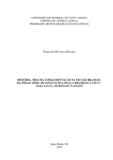| dc.creator | Silveira, Tuani de Oliveira | |
| dc.date.accessioned | 2021-11-16T18:56:44Z | |
| dc.date.available | 2021-11-16T18:56:44Z | |
| dc.date.issued | 2020-02-21 | |
| dc.identifier.uri | http://repositorio.ufsm.br/handle/1/22819 | |
| dc.description.abstract | This study aims to analyze the representation of memory, trauma, and fragmentation in the novels Zero (1975), by Ignácio de Loyola Brandão, and Em câmara lenta (1977), by Renato Tapajós, written during the Brazilian Military Dictatorship (1964-1985). The study is justi-fied because, due to the censorship imposed by the military regime, there was a ban on data and documents that stimulate the understanding of this period by researchers in the area of Human Sciences. Because of this, there is a constant need to understand the possible rela-tionships between memory, trauma, and form in novels that represented the historical period in question, characterized by authoritarianism. The novels Zero and Em câmara lenta ex-emplify, through theme and fragmented form, the traumatic impact that violence had during this period of history. Despite having distinct structures, fragmentation appears in the for-mal composition of Zero and Em câmara lenta as an attempt to represent the chaotic reality of the dictatorial period and to show the traumatic impact caused by authoritarian practices of repression and especially torture. By returning to this subject through these novels, this research enables an understanding of the society of the time from the analysis of thematic and formal strategies employed in narratives allied to the social functions of books. In add-tion, the reflections presented in this work through the comparative analysis of the novels provide a reflection on the relationship between trauma, memory, and fragmentation present in the works, proving that these books can be mechanisms of denunciation of dictatorial history. Thinking about the violence of dictatorship and how it was represented in some literary works leads to a possible understanding of the processes of constitution of the coun-try so that the practices of authoritarianism and violence should not be repeated at the pre-sent moment. To support this approach, we sought support from authors such as Sigmund Freud, Walter Benjamin, Dori Laub, Nestor Braunstein, Marcio Seligmann-Silva, Jaime Ginzburg, Regina Dalcastagnè, and Tania Pellegrini. | eng |
| dc.language | por | por |
| dc.publisher | Universidade Federal de Santa Maria | por |
| dc.rights | Attribution-NonCommercial-NoDerivatives 4.0 International | * |
| dc.rights.uri | http://creativecommons.org/licenses/by-nc-nd/4.0/ | * |
| dc.subject | Zero | por |
| dc.subject | Em câmara lenta | por |
| dc.subject | Memória | por |
| dc.subject | Trauma | por |
| dc.subject | Ditadura militar | por |
| dc.subject | Ignácio de Loyola Brandão | por |
| dc.subject | Renato Tapajós | por |
| dc.subject | Memory | eng |
| dc.subject | Military dictatorship | eng |
| dc.title | Memória, trauma e fragmentação na ficção brasileira pós-64: Zero, de Ignácio de Loyola Brandão, e Em câmara lenta, de Renato Tapajós | por |
| dc.title.alternative | Memory, trauma, and fragmentation in brazilian post-64 fic-tion: Zero, by Loyola Brandão and Em câmara lenta, by Renato Tapajós | eng |
| dc.type | Dissertação | por |
| dc.description.resumo | Este trabalho visa à análise da representação da memória, do trauma e da fragmentação nos romances Zero (1975), de Ignácio de Loyola Brandão, e Em câmara lenta (1977), de Renato Tapajós, escritos durante a Ditadura Militar brasileira (1964-1985). O estudo se justifica porque, devido à censura imposta pelo regime militar então em curso, houve limitações de dados e de documentos que estimulassem a compreensão desse período por parte dos pes-quisadores na área das Ciências Humanas. Em virtude disso, há uma necessidade constante de compreensão das possíveis relações entre memória, trauma e forma em obras que repre-sentam o período histórico em questão, caracterizado pelo autoritarismo. Os romances Zero e Em câmara lenta exemplificam, através do tema e da forma fragmentada, o impacto trau-mático que a violência causou durante esse período da história. Apesar de terem estruturas distintas, a fragmentação aparece na composição formal de Zero e Em câmara lenta como uma tentativa de representar a realidade caótica do período ditatorial e mostrar o impacto traumático causado pelas práticas autoritárias de repressão e, principalmente, da tortura. Ao retomar esse assunto por meio desses romances, esta pesquisa possibilita uma compreensão sobre a sociedade da época a partir da análise das estratégias temáticas e formais emprega-das nas narrativas aliadas à função social dos livros. Além disso, as reflexões apresentadas neste trabalho por meio da análise comparatista dos romances proporcionam a reflexão so-bre a relação entre o trauma, a memória e a fragmentação presentes nas obras, comprovando que esses livros podem ser mecanismos de denúncia da história ditatorial. Pensar sobre a violência da ditadura e a forma como foi representada em algumas obras literárias leva a uma possível compreensão dos processos de constituição do país de modo que as práticas de autoritarismo e de violência não devam ser repetidas no momento presente. Para o embasa-mento dessa abordagem, buscou-se respaldo em autores como Sigmund Freud, Walter Ben-jamin, Dori Laub, Néstor Braunstein Márcio Seligmann-Silva, Jaime Ginzburg, Regina Dal-castagnè e Tânia Pellegrini. | por |
| dc.contributor.advisor1 | Calegari, Lizandro Carlos | |
| dc.contributor.advisor1Lattes | http://lattes.cnpq.br/812367213289539 | por |
| dc.contributor.referee1 | Porto, Luana Teixeira | |
| dc.contributor.referee2 | Umbach, Rosani Úrsula Ketzer | |
| dc.creator.Lattes | http://lattes.cnpq.br/0508468492538451 | por |
| dc.publisher.country | Brasil | por |
| dc.publisher.department | Letras | por |
| dc.publisher.initials | UFSM | por |
| dc.publisher.program | Programa de Pós-Graduação em Letras | por |
| dc.subject.cnpq | CNPQ::LINGUISTICA, LETRAS E ARTES::LETRAS | por |
| dc.publisher.unidade | Centro de Artes e Letras | por |



